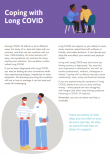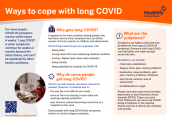Long COVID is a term used to describe the symptoms that continue or develop after the initial COVID-19 illness and cannot be explained by any other condition. You might also hear long COVID being called post-COVID syndrome or condition, long-haul COVID, post-acute COVID or chronic COVID. The symptoms of long COVID may last weeks or months after the acute stage of the illness.
So far there is no specific definition of long COVID that has been agreed upon internationally but the National Institute for Health and Care Excellence (NICE) in the UK describes post-COVID-19 syndrome as “signs and symptoms that develop during or after an infection consistent with COVID-19, continue for more than 12 weeks and are not explained by an alternative diagnosis. It usually presents with clusters of symptoms, often overlapping, which can fluctuate and change over time and can affect any system of the body.”
We're aware of a problem when trying to use Zero Data to link to Healthify. Zero Data is managed by Health NZ and we are working with them to get this fixed.
Long COVID
Also called post-COVID syndrome, long-haul COVID, post-acute COVID and chronic COVID
Key points about long COVID
- Long COVID is a term used to describe the effects of COVID-19 that continue for weeks or months beyond the initial illness.
- Although for most people with COVID infection, symptoms resolve within 4 weeks of illness, for some people symptoms can persist for longer than 12 weeks.
- Symptoms may change over time and new symptoms may develop.
- Read about what is known about long COVID and how you might manage it if it's something you experience after having COVID.

There is ongoing research about whether some people are more likely to develop long COVID. It appears to be more common among people with more severe initial symptoms but can also affect those who initially had mild or moderate COVID-19 symptoms. Although it can occur in people of all ages, it is less common in children and adolescents. Read more about long COVID in children.(external link)
Some factors that may be associated with increased risk of long COVID have been identified. These include:
- being older
- having more than 1 underlying chronic medical conditions
- having a higher body mass index (obesity)
- being female
- being admitted to hospital during the acute phase of COVID-19.
There is no clear answer to the question of why some people develop long COVID, and more research is needed. However, it could be due to:
- the way the virus affects the body – particular the nervous and vascular systems
- some of the virus staying in your body and triggering ongoing symptoms
- your immune system becoming overactive as a response to being infected with the COVID-19 virus.
It seems that some people with long COVID are experiencing symptoms that are similar to chronic fatigue syndrome.
There is no test for long COVID and the symptoms people experience are highly varied and may be different from the typical COVID-19 symptoms. There appears to be no specific time course, symptoms may improve one week and relapse the next.
| People have reported the following symptoms | |
Cardiovascular symptoms
|
General symptoms
|
Neurological symptoms
|
Ear, nose and throat symptoms
|
Respiratory symptoms
|
|
People have also experienced symptoms of anxiety, depression or post-traumatic stress disorder (PTSD) resulting from their diagnosis, admission to hospital, the ongoing illness or psychosocial effects.
As long COVID is still new, scientists and healthcare providers are still working out the best ways to manage and treat it. There are no specific treatments, and management usually involves managing the symptoms that affect you the most. It is important to realise that recovery from viral infections can take a long time.
For support and management of long COVID symptoms you should talk to your doctor or healthcare team, particularly if you develop new symptoms or if your symptoms get worse. As everyone with long COVID experiences it differently, a broad approach to management needs to be taken. This means that a range of healthcare professionals may be involved, depending on your particular symptoms. For example, occupational therapists, physiotherapists, speech and language therapists, dietitians, social workers and exercise physiologists may be included in your ongoing care team.
It is important that you don't try to rush your recovery, make sure you get adequate rest and pace yourself – plan what you’re going to do and don’t over-exert yourself.
Here are some tips on:
| Contact your GP if you develop any new or worsening symptoms, such as: |
|
| Call 111 or seek urgent medical care if you have any of the following: |
|
Apps reviewed by Healthify
You may find it useful to look at some Breathing apps, Symptom checkers, and Symptom trackers.
Because of the lack of clarity around the symptoms and experiences of long COVID, it can be useful to keep track of your symptoms. Recording them in a diary or keeping a log can help to:
- better understand your symptoms
- work out which symptoms are affecting you the most
- identify any patterns and changes in your symptoms.
You may find it useful to take your diary to appointments with your healthcare providers so they can see what has been happening for you over time. Find our symptom diaries here.
The best way to prevent post-COVID conditions is to prevent COVID-19 illness. Getting vaccinated against COVID-19 as soon as you can is the best way to prevent getting COVID-19. There is some evidence that being vaccinated reduces the risk of developing long COVID following a COVID-19 infection.
Vaccination against COVID-19 continues to be available to all New Zealand adults and children over the age of 5 years old. Find out more about COVID-19 vaccination.
Tū Pakari, Tū Taha – Tangata Whaiora hesitant about the COVID-19 vaccine | Chloe Fergusson-Tibble
This video may take a few moments to load.
Video from Te Hiringa Hauora - Health Promotion Agency(external link) Tangata Whaiora hesitant about the COVID-19 vaccine | Chloe Fergusson-Tibble
Most people make a full recovery, but it takes a variable length of time. Monitor your symptoms and seek help if you are not improving. Your doctor can help you with decisions around returning to work and other activities.
Sources of support
The lack of information about long COVID and support for those experiencing it can be frustrating. Remember you are not alone – there are people all around the world experiencing long COVID.
Long Covid Support Aotearoa(external link) provides information about support for long COVID and also has a link to the Long COVID Registry Aotearoa New Zealand(external link).
There are online groups established for people with long COVID where you can get support and meet others experiencing this condition:
- Facebook group for Long COVID NZ(external link)
- Facebook group for Long COVID(external link)
- X (Twitter) @LongCovidNZ(external link)
Complex Chronic Illness Support(external link) provides information, support and practical advice for people, families and carers affected by ME/CFS (myalgic encephalomyelitis/chronic fatigue syndrome).
ME Support(external link)(external link) is a charity helping New Zealanders with ME/CFS and their whānau or carers.
Managing post–COVID-19 symptoms(external link) The Royal Australian College of General Practitioners
How to manage post-viral fatigue after COVID-19 [PDF, 1.1 MB] Royal College of Occupational Therapists, UK
Support for rehabilitation self-management after COVID-19 related illness(external link) World Health Organization
Recovering from COVID – including long COVID(external link) KidsHealth, NZ
Information for people experiencing long COVID and their whānau(external link) NIHI, NZ, 2022
Apps
Breathing apps
Symptom checkers
Symptom trackers
Resources
Ways to cope with long COVID [PDF, 356 KB] Healthify He Puna Waiora, NZ, 2023 English [PDF, 356 KB], te reo Māori [PDF, 152 KB], Samoan [PDF, 162 KB], Tongan [PDF, 296 KB], Cook Islands Māori [PDF, 1.3 MB], Chinese (simplified) [PDF, 279 KB]
Coping with Long COVID(external link) Mental Health Foundation, NZ, 2023
Patient resource – managing post–COVID-19 symptoms(external link) The Royal Australian College of General Practitioners, 2020
How to manage post-viral fatigue after COVID-19 [PDF, 1.1 MB] Royal College of Occupational Therapists, UK, 2020
Support for rehabilitation self-management after COVID-19 related Illness(external link) World Health Organisation, Europe, 2020
Covid-19 your health and symptom diary [PDF, 615 KB] Healthify He Puna Waiora, NZ, 2021
References
- Long COVID(external link) National Institute for Health Innovation (NIHI), University of Auckland, NZ, 2021
- Post-COVID-19 conditions(external link) Auckland Region HealthPathways, NZ, 2021
- Vaccines long COVID(external link) Yale Medicine, US, 2021
- Coronavirus (COVID-19)(external link) UK Government, 2022
- Long COVID – another strong reason to get vaccinated(external link) IMAC, NZ, 2022
- COVID-19 rapid guideline – managing the long-term effects of COVID-19(external link) NICE, UK, 2024
- Long COVID(external link) Health New Zealand | Te Whatu Ora, 2024
Webinar: Diagnosing long COVID in the community
This webinar presented by Kate Te Pou (Nurse Practitioner, Long Term Conditions Team, Health New Zealand | Te Whatu Ora – Te Matau a Maui) and Amy I'Leary (Occupational Therapist, Long COVID patient) covers the following:
- Long-term consequences of COVID-19 infections and an approach to treatment.
- Common symptoms associated with long COVID.
- Management principles for patients with Long COVID utilising a 3 tier care pathway for rehabilitation.
- Key intervention strategies with a focus on outcome measures and care action plans.
- Access to national resources and MoH guidelines.
Video: MHH Webinar - Long COVID
You can watch the video, answer questions and receive a certificate. This may take a few moments to load.
(My Health Hub, NZ, 2023)
Resource
Long COVID – an evolving enigma(external link) BPAC, NZ, 2023
Clinical rehabilitation guide NZ
Clinical rehabilitation guideline for people with long COVID in Aotearoa New Zealand(external link) Ministry of Health, NZ, 2022
- 49 page guideline for long COVID conditions in both children and adults in Aotearoa New Zealand.
- Covers definition, diagnosis, and current best evidence to assist outcomes for individuals with long COVID.
- Intended for use by hospital and community clinicians, policy makers, funders, parents, whānau and individuals with long COVID.
Factsheet for clinicians,(external link) Ministry of Health, NZ, 2022
- 51 page factsheet with a range of useful links and resources
Clinical rehabilitation guideline for people with long COVID for clinicians(external link) Ministry of Health, NZ, 2022
Additional resources – international
- COVID-19 rapid guideline – managing the long-term effects of COVID-19(external link) NICE, UK, 2024
- Management of post-acute COVID-19 in primary care(external link) BMJ 2020;370:m3026
Apps
Brochures

Coping with Long COVID
Mental Health Foundation, NZ, 2023

Credits: Healthify editorial team. Healthify is brought to you by Health Navigator Charitable Trust.
Page last updated:





